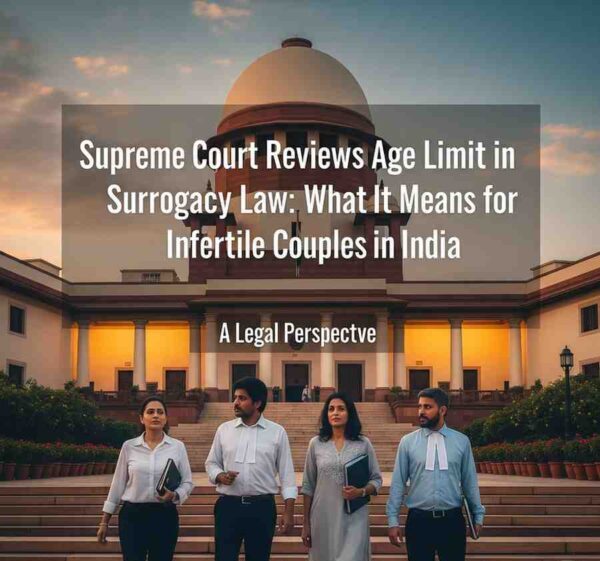The Supreme Court is reviewing the age limits imposed under India’s surrogacy regulations. Will older couples get justice? Know what the case means for future surrogacy in India
Introduction: Hope and Hurdles in Surrogacy
Surrogacy has offered a life-changing opportunity to many Indian couples struggling with infertility. But recent changes in India’s surrogacy laws have made it difficult for several families to continue or complete their surrogacy journey. In 2024, the Supreme Court of India reserved its verdict on a group of petitions challenging these new restrictions — particularly the age limits imposed by the Surrogacy (Regulation) Act, 2021.
One of the key cases in this matter is Arun Muthuvel v. Union of India, which focuses on couples who began the surrogacy process before the law changed in January 2022, but are now unable to proceed because they no longer meet the new age requirements.
What Is the Main Issue in the Case?
The problem lies with couples who had already started medical procedures for surrogacy before January 2022. Due to delays — particularly during the COVID-19 pandemic — many of them could not complete their treatment in time. Under the new law, the woman must be between 23 to 50 years old and the man between 26 to 55 years old to be eligible for surrogacy. Unfortunately, several couples crossed this age limit while waiting and now find themselves legally disqualified.
One heartbreaking example presented to the court involved a couple aged 62 and 56. They lost their only child in 2018 and had started fertility treatment in 2019. However, due to pandemic delays, their embryo transfer took place only in 2022. When the first attempt failed, they tried again — but by then, they had crossed the legal age barrier.
These couples argue that the new law is being applied retrospectively without any transitional provision or “grandfather clause” to protect those who had already begun treatment.
Key Observations by the Supreme Court
A Supreme Court bench of Justices B V Nagarathna and K V Viswanathan raised several strong questions during the hearings. Justice Nagarathna asked:
“Why is surrogacy banned for older couples when natural late-age pregnancies are not prohibited by law?”
She also emphasized that the law seemed too rigid and lacked compassion. According to her:
“Genuine intending couples who started the process are simply stopped… as if the law says: ‘No children for you!’ That’s harsh.”
The court further noted that the law was created mainly to prevent exploitation in commercial surrogacy, not to punish sincere, deserving couples.
What Is the Government’s Argument?
The Union Government, represented by Additional Solicitor General Aishwarya Bhati, defended the age restrictions on medical and ethical grounds. The key points were:
- Age caps are based on medical expert advice
- They align with natural reproductive biology
- Advanced age can increase genetic risks for the child
- Older parents may not be able to care for the child for 20+ years
Petitioners’ Counterarguments
On the other hand, the petitioners argued that:
- Retrospective application of the law violates Article 14 (Right to Equality)
- It also infringes Article 21 (Right to Personal Liberty & Reproductive Autonomy)
- Couples who had already invested emotionally and financially should not be penalized
- A transitional clause should have been added for ongoing cases
Key Legal Provisions on Surrogacy in India
The two major laws governing surrogacy and fertility treatment in India are:
- The Surrogacy (Regulation) Act, 2021
- The Assisted Reproductive Technology (Regulation) Act, 2021
🔑 Important Features:
- The law permits solely altruistic surrogacy, restricting any form of payment except for medical-related costs.
- Commercial surrogacy is strictly banned
- Surrogacy is allowed only for:
- Married heterosexual couples (woman 23–50, man 26–55)
- Divorced or widowed women (35–45)
- Surrogate must be:
- A close relative
- A woman aged 25 to 35, married, and with a minimum of one biological child.
- Not allowed to donate her egg
- A woman may undertake surrogacy just once during her life.
- All clinics must be registered and overseen by national and state boards
Current Controversies
Several categories of people are excluded under the current law:
- Unmarried single women (unless widowed or divorced)
- Single men
- LGBTQ+ individuals and couples
- Live-in partners
Major Criticisms:
- Too restrictive and not inclusive
- Requiring a close relative as a surrogate is impractical
- Could push surrogacy into illegal or underground markets
- No clear definition of “close relative”
- No flexibility or exceptions for genuine cases
Conclusion: What’s at Stake?
The Supreme Court’s final verdict in this case will set a crucial precedent. It will decide whether the law can balance reproductive rights with social and medical concerns. Many believe the law needs to be revisited with empathy and practicality, especially for couples who started their journey in good faith but are now caught in legal limbo.
Thousands of families across India are waiting — not just for a baby, but for justice and recognition of their dream to become parents.

























